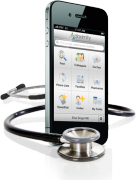Article
Is the Smartphone Smart Enough to Treat Major Depression?
Author(s):
A clinical trial is evaluating the use of the Kokoro app to deliver a smartphone-based CBT program to patients being treated for depression.

Major depression is debilitating and difficult to treat. While pharmacotherapy, mostly in the form of antidepressants, is typically first-line treatment for most patients suffering from depression, several studies have shown that cognitive-behavior therapy (CBT), either alone or in combination with medication, can be an effective treatment option as well.
The challenge with CBT, however, is that it requires experienced therapy and substantive dedicated time to be effective; a typical course of CBT involves up to sixteen 1-hour face-to-face sessions led by an experienced therapist.What if, a new study in the journal Trials asks, CBT could be effectively given by that most ubiquitous of tools: the smartphone?
Previous studies of computer- or internet-based CBT “led to a greater proportion of dropouts but to better efficacy at an effect size of 0.48 (0.33 to 0.63) in the short-term follow up than those in control conditions, whilst to neither superiority nor inferiority in the long term,” the study authors note. They posited that a smartphone-based treatment, with its greater portability and accessibility, might be more effective.
The study authors describe a currently underway multi-center, randomized trial being conducted since September 2014. The trial is testing a 9-month, smartphone-based CBT program named the “Kokoro App.” The study is looking at the effectiveness of switching antidepressants and starting the smartphone-based CBT program at the same time, in comparison to switching antidepressants only, among patients still suffering from depression after adequate antidepressant treatment.
The program consists of an introduction, followed by 6 sessions and an epilogue. It is designed to be completed by patients within 9 weeks. The trial involves 164 patients with major depressive disorder and still suffering from depressive symptoms after adequate antidepressant treatment for more than 4 weeks. The primary outcome will be the change in the total score on the Patient Health Questionnaire through the 9 weeks of the program, as assessed at week 0, 1, 5 and 9 via telephone by blinded raters. Secondary outcomes include the change in the total score of the Beck Depression Inventory-II, change in side effects as assessed by the Frequency, Intensity and Burden of Side Effects Rating, and treatment satisfaction.
The Kokoro-App, available on Apple iPhones and iPads has been developed based on an empirically supported CBT manual and pilot-tested for feasibility and acceptability. It consists of eight sections, including one introductory section, two sessions on self-monitoring, two sessions on behavioral activation, two sessions on cognitive restructuring, and one epilogue. Participants need to complete additional “homework” between sessions. Each session takes approximately 30 minutes. Participants and their attending physicians can check the entries made by the participants into the program and discuss during their consultations.
The study period of the trial is from September, 2014 to March, 2017.




